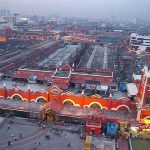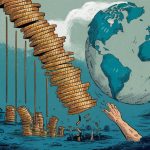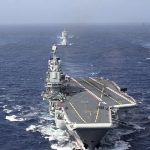
Trump targets India on high tariffs, vows to reciprocate
Last Updated on October 12, 2024 5:49 am
AFTER CALLING India a “tariff king” and a “trade abuser” in the run-up to the US presidential elections, Republican nominee and former president Donald Trump has now vowed to introduce a reciprocal tax against India if elected to office next month.
Speaking in Detroit, Trump said the US is liberal when it comes to tariffs, but countries like China, Brazil and India impose high tariffs. He said India imposes the highest tariffs and American businesses have cited high tariffs as a challenge in the Indian market.
“Perhaps the most important element of my plan to make America extraordinarily wealthy again is reciprocity. It’s a word that’s very important in my plan because we generally don’t charge tariffs. I started that process, it was so great, with the vans and the small trucks, etc,” Trump said Thursday, according to a PTI report.
“We really don’t charge. China will charge us a 200 per cent tariff. Brazil is a big charger. The biggest charger of all is India,” he said.
Recalling his meeting with representatives of Harley-Davidson motorcycles during his presidency, Trump said the company cited 150 per cent tariffs as a key challenge to doing business in India. Harley-Davidson had, in fact, discontinued its sales and manufacturing operations in India in 2020, after a decade of unsuccessful efforts to gain a foothold in the country.
“India is a very big charger. We have a great relationship with India. I did. And especially with the leader, Modi. He’s a great leader… I think they probably charge more than, in many ways, China. But they do it with a smile,” Trump told members of the Detroit Economic Club.
There are three issues here. One, it is a fact that average tariffs in India have been heading northwards — rising to 18.1 per cent in 2022 from an average 13 per cent in 2014. Two, the US is India’s largest trade partner, with total bilateral trade nearing $120 billion in FY24, and while India runs a goods trade deficit with nine of its ten top trading partners, the US is the only major economy to which India exports more than it imports. Three, for Trump, his rhetoric of the pitfalls of open trade ties in with his consistent narrative of the US being over-exploited by other countries.
Indian policymakers, though, have argued that most countries have had high protection for their domestic industries in early stages of growth, and that India is no different in doing so now to spur manufacturing. New Delhi has introduced production-linked incentive schemes for 14 priority sectors and uses tariffs to boost local production, which is seen as not being very different from similar schemes rolled out by Washington, including the Chips Act and the Inflation Reduction Act.
Trump’s comments on tariffs come at a time when countries globally are taking protective measures against Chinese imports, fearing job losses in domestic markets. This includes the US, which has raised tariff barriers, specifically targeting imports from China.
On Monday, External Affairs Minister S Jaishankar had said that one of the impacts of globalisation over the past 25 years has been job losses and dissatisfaction with the quality of life in many societies, as trade has not only been globalised but also weaponised.
Earlier this month, the US imposed fresh tariffs targeting new sectors such as electric vehicles (EVs). This came amid fears that a new wave of Chinese products in clean energy and high-tech sectors — dubbed China Shock 2.0 — could cause job losses in several regions, including India. The first shock occurred when cheap Chinese goods flooded global markets following China’s entry into the WTO in 2001, resulting in job losses worldwide.
Meanwhile, European steelmakers have also raised alarm over rising Chinese imports. The Financial Times reported last month that European steelmakers have appealed to trade officials to address a surge in Chinese steel exports that have driven European prices below the cost of production. Indian steelmakers have also asked the government to impose anti-dumping duties on Chinese steel, as profits in the industry are being eroded.






